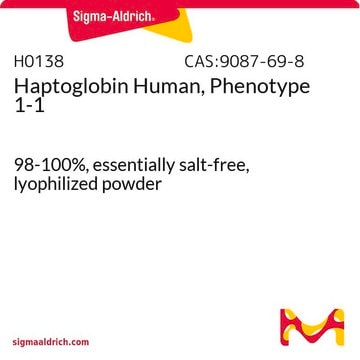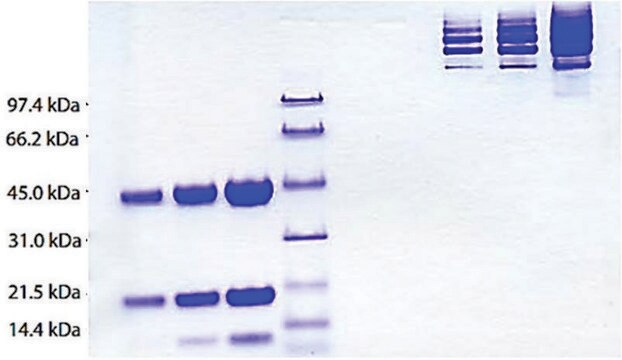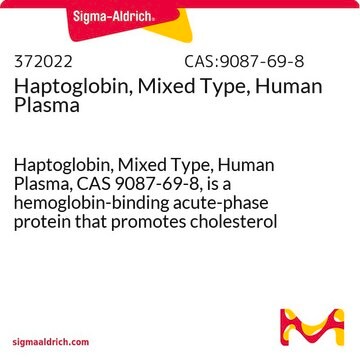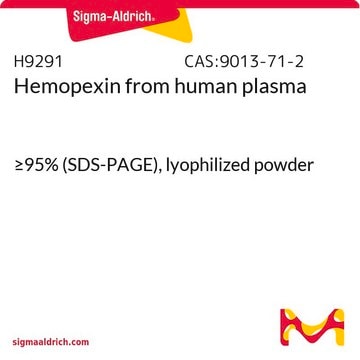SRP6507
Haptoglobin (Phenotype 1-1) from human plasma
≥95% (SDS-PAGE)
Synonym(s):
Hp 1-1
Sign Into View Organizational & Contract Pricing
All Photos(1)
About This Item
UNSPSC Code:
12352202
NACRES:
NA.32
Recommended Products
General description
Haptoglobin is a positive acute-phase plasma α2-sialoglycoprotein, and exists as three major phenotypes namely Hp 1-1, Hp 2-1, and Hp 2-2. Haptoglobin is composed of heavy β- (40 kDa) and light α- (α1= 8.9kDa and α2= 16kDa) chains. Hp 1-1 is the smallest phenotype with a molecular weight of 86kDa, and is composed of only α1.
Biochem/physiol Actions
Haptoglobin functions as an antioxidant by binding free hemoglobin, and eliminates it from circulation to prevent iron loss and renal injury following hemolysis. It is responsible for maintaining the helper T-cell type 1 and type 2 (Th1/Th2) balance, and functions as an immunosuppressor of lymphocyte function. It also functions as an angiogen and anti-inflammatory agent. Hp 1-1 phenotype is most effective in binding free hemoglobin and preventing inflammatory responses linked with free hemoglobin. Studies show that all the three phenotypes of haptoglobin are involved in idiopathic generalized epilepsy.
Physical form
Lyophilized as a salt-free solid.
Storage Class Code
11 - Combustible Solids
WGK
WGK 3
Flash Point(F)
Not applicable
Flash Point(C)
Not applicable
Choose from one of the most recent versions:
Certificates of Analysis (COA)
Lot/Batch Number
Don't see the Right Version?
If you require a particular version, you can look up a specific certificate by the Lot or Batch number.
Already Own This Product?
Find documentation for the products that you have recently purchased in the Document Library.
Customers Also Viewed
Determination of haptoglobin genotype in an Iranian population with idiopathic generalized epilepsy.
Al-Balaghee S et al
Reports of Biochemistry and Molecular Biology, 3(2), 51-55 (2015)
Haptoglobin phenotypes in health and disorders.
Sadrzadeh SM, Bozorgmehr J, et al.
American Journal of Clinical Pathology, 121, S97-104 (2004)
Haptoglobin phenotypes in epilepsy.
Sadrzadeh SM, et al.
Clinical Chemistry, 50(6), 1095-1097 (2004)
Amrita Sharma et al.
iScience, 25(11), 105302-105302 (2022-10-29)
NEU-4438 is a lead for the development of drugs against Trypanosoma brucei, which causes human African trypanosomiasis. Optimized with phenotypic screening, targets of NEU-4438 are unknown. Herein, we present a cell perturbome workflow that compares NEU-4438's molecular modes of action
Fabiana Baganha et al.
International journal of molecular sciences, 23(21) (2022-11-12)
Phosphorylcholine (PC) is one of the main oxLDL epitopes playing a central role in atherosclerosis, due to its atherogenic and proinflammatory effects. PC can be cleared by natural IgM antibodies and low levels of these antibodies have been associated with
Our team of scientists has experience in all areas of research including Life Science, Material Science, Chemical Synthesis, Chromatography, Analytical and many others.
Contact Technical Service









